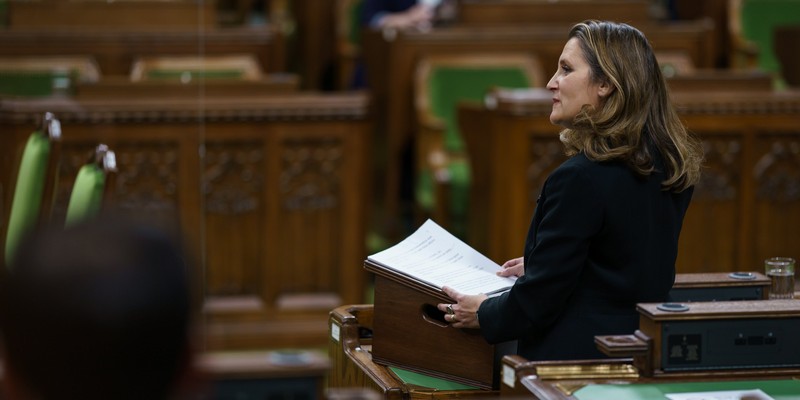Federal budget speech disregards key drivers of economic prosperity

Finance Minister Chrystia Freeland’s speech when tabling this year’s federal budget signalled the areas of priority for the Trudeau government in coming years. In particular, the budget speech emphasized a growing role for the government in the economy while disregarding the importance of entrepreneurship, innovation and private-sector investment.
In a speech with more than 3,500 words, “government” was mentioned 11 times with another 102 references to “we” as in “we the government.” These terms in the text largely preceded announcements of new government spending or expansions of existing programs. Initiatives included additional money for infrastructure and “green” technology, national daycare, the Canada Recovery Hiring Program and affordable housing.
Put simply, the Trudeau government envisions a larger role in the economy, in both the short-term and long-term. However, economic success is not the reality borne out by past experience with growing government intervention. For instance, during the 2016 to 2019 period, Canada saw relatively low rates of growth in incomes, private-sector job creation and the economy more broadly (private-sector investment actually declined by an annual average of 0.9 per cent).
It’s also informative to examine what was excluded, or at least rarely stated, in the budget speech. For example, the word “entrepreneur” is mentioned only twice—a reference to a $2.2 billion fund to promote manufacturing and life sciences and a generic reference to building for the future by investing in entrepreneurs. These sparse mentions are especially puzzling when considering the crucial role entrepreneurs play in innovation, job creation and economic growth.
Similarly, the term “innovation” only appeared four times in the speech. Each mention of the term, however, related to government programs or government involvement in the economy rather than providing an attractive economic environment encouraging the private sector to innovate.
The speech also largely omitted the importance of attracting private-sector investment. Of the 17 uses of the word “investment,” only two referenced the private sector. The remaining 15 mentions all referred to government investments. This is especially concerning because the Trudeau government experienced the lowest average rate of business investment growth (2016 to 2019) of the last five prime ministers going back to Brian Mulroney.
No references were made about competitiveness and there were only two references about the significance of being “competitive.” The first mention relates to a new government initiative to train 28,000 Canadians—what Ottawa calls a Canadian technology corps—and send them out to work with small and medium-sized businesses so they can go “digital and become more competitive and efficient.” The second mention related to the development of green exports and being more “competitive” in general.
Clearly, little attention was given to establishing a more innovative and competitive economy driven by entrepreneurship, businessowners and investment. For instance, there’s no plan to reduce barriers to foreign direct investment in critical industries such as telecommunications and banking. Reforms to the tax and regulatory system were also almost completely ignored. Instead, the Trudeau government chose to continue a top-down approach that has been unsuccessful in the past.
This year’s budget speech largely ignored the vital and essential role entrepreneurs, innovation and investment play in Canada’s economy. The Trudeau government’s emphasis on expanding government will not result in higher economic growth or prosperity more generally.

